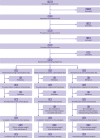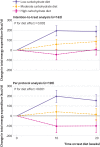Effects of a low carbohydrate diet on energy expenditure during weight loss maintenance: randomized trial
- PMID: 30429127
- PMCID: PMC6233655
- DOI: 10.1136/bmj.k4583
Effects of a low carbohydrate diet on energy expenditure during weight loss maintenance: randomized trial
Erratum in
-
Effects of a low carbohydrate diet on energy expenditure during weight loss maintenance: randomized trial.BMJ. 2020 Nov 3;371:m4264. doi: 10.1136/bmj.m4264. BMJ. 2020. PMID: 33144344 Free PMC article. No abstract available.
Abstract
Objective: To determine the effects of diets varying in carbohydrate to fat ratio on total energy expenditure.
Design: Randomized trial.
Setting: Multicenter collaboration at US two sites, August 2014 to May 2017.
Participants: 164 adults aged 18-65 years with a body mass index of 25 or more.
Interventions: After 12% (within 2%) weight loss on a run-in diet, participants were randomly assigned to one of three test diets according to carbohydrate content (high, 60%, n=54; moderate, 40%, n=53; or low, 20%, n=57) for 20 weeks. Test diets were controlled for protein and were energy adjusted to maintain weight loss within 2 kg. To test for effect modification predicted by the carbohydrate-insulin model, the sample was divided into thirds of pre-weight loss insulin secretion (insulin concentration 30 minutes after oral glucose).
Main outcome measures: The primary outcome was total energy expenditure, measured with doubly labeled water, by intention-to-treat analysis. Per protocol analysis included participants who maintained target weight loss, potentially providing a more precise effect estimate. Secondary outcomes were resting energy expenditure, measures of physical activity, and levels of the metabolic hormones leptin and ghrelin.
Results: Total energy expenditure differed by diet in the intention-to-treat analysis (n=162, P=0.002), with a linear trend of 52 kcal/d (95% confidence interval 23 to 82) for every 10% decrease in the contribution of carbohydrate to total energy intake (1 kcal=4.18 kJ=0.00418 MJ). Change in total energy expenditure was 91 kcal/d (95% confidence interval -29 to 210) greater in participants assigned to the moderate carbohydrate diet and 209 kcal/d (91 to 326) greater in those assigned to the low carbohydrate diet compared with the high carbohydrate diet. In the per protocol analysis (n=120, P<0.001), the respective differences were 131 kcal/d (-6 to 267) and 278 kcal/d (144 to 411). Among participants in the highest third of pre-weight loss insulin secretion, the difference between the low and high carbohydrate diet was 308 kcal/d in the intention-to-treat analysis and 478 kcal/d in the per protocol analysis (P<0.004). Ghrelin was significantly lower in participants assigned to the low carbohydrate diet compared with those assigned to the high carbohydrate diet (both analyses). Leptin was also significantly lower in participants assigned to the low carbohydrate diet (per protocol).
Conclusions: Consistent with the carbohydrate-insulin model, lowering dietary carbohydrate increased energy expenditure during weight loss maintenance. This metabolic effect may improve the success of obesity treatment, especially among those with high insulin secretion.
Trial registration: ClinicalTrials.gov NCT02068885.
Published by the BMJ Publishing Group Limited. For permission to use (where not already granted under a licence) please go to http://group.bmj.com/group/rights-licensing/permissions.
Conflict of interest statement
Competing interests: All authors have completed the ICMJE uniform disclosure form at www.icmje.org/coi_disclosure.pdf and declare: research support for the submitted work as described above; no financial relationships with any organisations that might have an interest in the submitted work in the previous three years; no other relationships or activities that could appear to have influenced the submitted work except as follows: CBE and DSL have conducted research studies examining the carbohydrate-insulin model funded by the National Institutes of Health and philanthropic organizations unaffiliated with the food industry; DSL received royalties for books on obesity and nutrition that recommend a low glycemic load diet.
Figures





Comment in
-
During weight-loss maintenance, energy expenditure was higher with lower-carbohydrate diets.Ann Intern Med. 2019 Mar 19;170(6):JC31. doi: 10.7326/ACPJ201903190-031. Ann Intern Med. 2019. PMID: 30884501 No abstract available.
